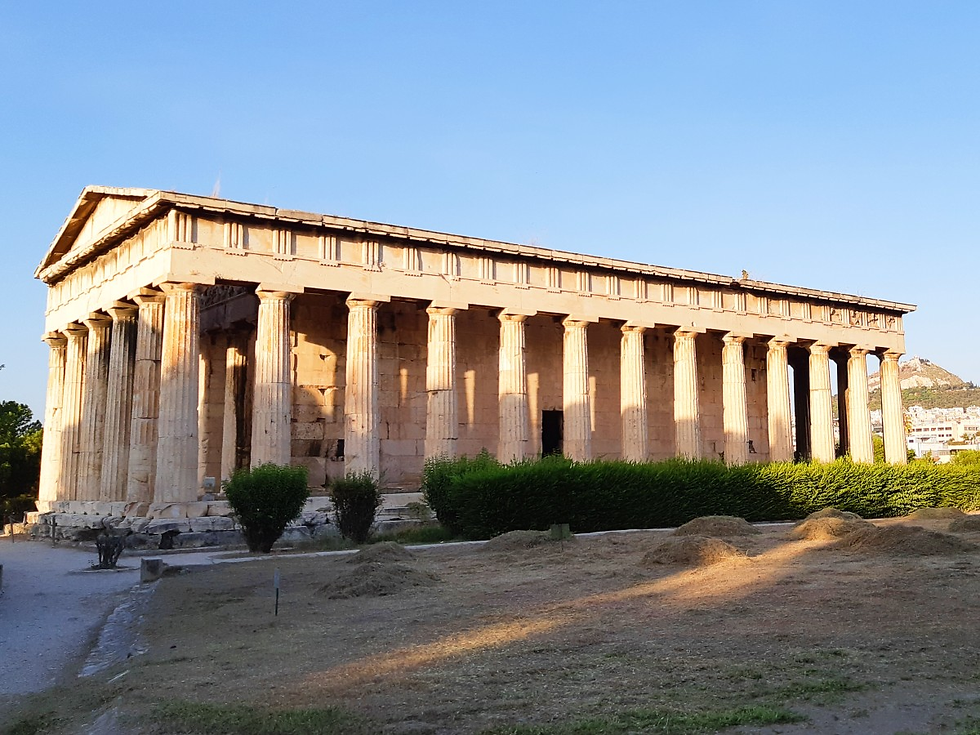Historical context of the Roman Forum and its connection to ancient Roman influence
- Johnny Ka
- Jul 31, 2023
- 3 min read
Updated: Aug 4, 2023
Introduction:
When one thinks of the Roman Forum, the iconic heart of ancient Rome, Athens may not immediately come to mind. However, the historical connections between ancient Athens and Rome run deep, and the influence of Roman civilization can be traced even within the boundaries of Athens, Greece. In this review, we will explore the historical context of the Roman Forum and its connection to the ancient Roman influence on Athens, shedding light on the intriguing interplay between these two great civilizations.

The Roman Forum - A Brief Overview:
The Roman Forum, or Forum Romanum in Latin, was the bustling central square of ancient Rome. It served as the political, social, and economic hub of the city, a place where citizens gathered to conduct business, engage in political debates, and witness grand spectacles. Over the centuries, it evolved and expanded, becoming a symbol of Roman power and civilization.
Roman Influence on Athens:
During the Roman era, Athens experienced a significant transformation as it became an integral part of the Roman Empire. This period, known as the Roman Greece era, saw the Romanization of various aspects of Athenian society, including architecture, governance, and cultural practices.

One notable manifestation of Roman influence in Athens is evident in the architecture of the city. Roman-style buildings, such as theaters and baths, were constructed, blending Roman architectural principles with the existing Greek structures. This fusion of architectural styles can be seen in the Odeon of Herodes Atticus, a Roman-era theater that stands in harmony with the surrounding ancient Greek ruins.
The Odeon of Agrippa - A Roman Contribution to Athens:
One prominent example of Roman influence in Athens is the Odeon of Agrippa, a theater that once graced the slopes of the Acropolis. Built in the 1st century BCE by Marcus Agrippa, a Roman statesman and general, this grand structure served as a venue for musical performances and other cultural events. Although the Odeon of Agrippa no longer stands in its entirety, its remains remind us of the significant role Roman patrons played in shaping the cultural landscape of Athens.

The Library of Hadrian - A Roman Architectural Marvel:
Another testament to Roman influence in Athens is the Library of Hadrian, a grand complex built during the Roman period. Named after the Roman Emperor Hadrian, the library contained vast collections of scrolls and served as a center for learning and intellectual pursuits. Today, the ruins of the Library of Hadrian serve as a reminder of the Roman commitment to education and the diffusion of knowledge in Athens.

The Arch of Hadrian - A Symbol of Roman Rule:
The Arch of Hadrian, a triumphal arch located near the Temple of Olympian Zeus, stands as a symbol of Roman rule in Athens. Erected in the 2nd century CE, this imposing structure marked the boundary between the old city of Athens and the new Roman city. It served as a testament to the power and authority of the Roman Empire, emphasizing their influence over Athens and its cultural identity.

The Emperor Hadrian and the Athenian Connection:
Emperor Hadrian played a pivotal role in shaping the landscape of Athens during the Roman period. He had a deep affinity for the city and contributed significantly to its cultural and architectural development. His passion for Greece and Athens, in particular, led to the restoration of many ancient Greek structures, including the Temple of Olympian Zeus and the Panathenaic Stadium. Hadrian's love for Athens and his contributions to its restoration highlight the enduring connection between Rome and Athens.

The Legacy of Roman Influence:
The Roman influence on Athens was not limited to architecture and infrastructure but extended to governance, legal systems, and cultural practices. The Romans introduced their administrative systems, incorporating elements of Roman law and governance into the Athenian society. This fusion of Roman and Greek traditions played a crucial role in shaping the identity of ancient Athens during the Roman era.
Conclusion:
While Athens is renowned for its rich ancient Greek heritage, it would be remiss to overlook the historical context of Roman influence within the city. The Roman Forum, the Odeon of Agrippa, the Library of Hadrian, and the Arch of Hadrian are just a few examples of the tangible connections between ancient Rome and Athens.
These structures serve as reminders of the Roman impact on Athenian architecture, culture, and governance. They reflect the enduring interplay between the two civilizations and highlight the significance of the Roman period in shaping the historical narrative of Athens.
Exploring the historical context of the Roman Forum and its connection to ancient Roman influence in Athens allows us to appreciate the complexities of history and the intermingling of civilizations. It is a testament to the enduring legacy of both ancient Greece and ancient Rome, reminding us of the interconnectedness and shared cultural heritage that continues to influence the world to this day.




Comments